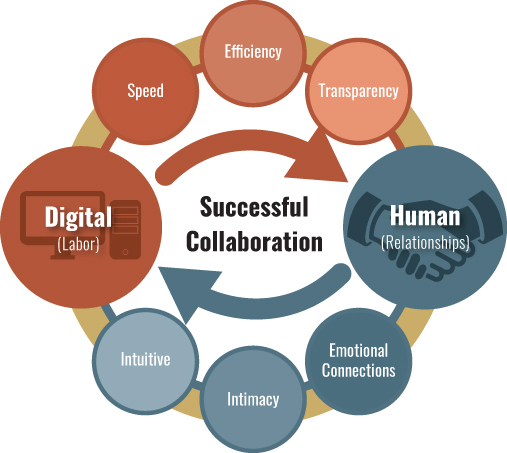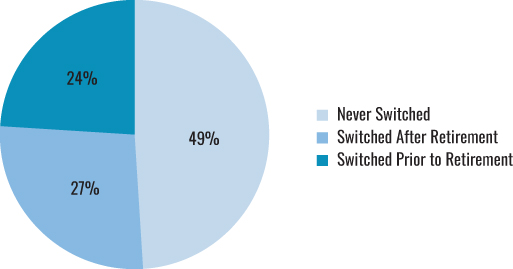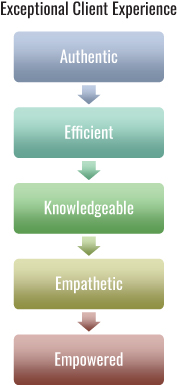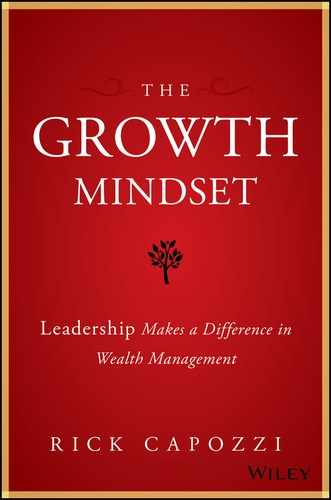Chapter 15
Exceptional Client Experience
“Quality is never an accident; it is always the result of high intention, sincere effort, intelligent direction and skillful execution; it represents the wise choice of many alternatives.”
—William A. Foster
As I discussed in Chapter 3, we can't have a great client experience without an outstanding culture. Because there are more than 300,000 advisors in the United States alone and most use similar products and business platforms, it's vital to set yourself apart. Separating your team from the overcrowded army of advisors starts with delivering excellence. The best news is the fact that clients value a great client experience, and providing that is completely in your control. Great service has a well‐defined vision, strategy, and process. The future will demand you segment your clients and provide the appropriate level of service for each group of clients. Platinum clients and silver clients can't receive the same level of attention and service. Everyone is committed and focused on getting the little things right. Let me say this differently: people get the big things right, but what separates you from the rest is getting the little things right—paying attention to the smallest details. Because if you can't get the small details right, you will be just like everyone else. In order to create a great client experience you need to leverage technology and have a well‐defined process working in collaboration with digital labor. It allows you as the advisor to establish the emotional connection with your client.

A Successful Collaboration
Ask Yourself:
- Do I do more listening than talking?
- Does everyone on the team understand what it means to deliver exceptional service?
- Does everyone on the team understand that he or she has a job because of the client?
- Does everybody understand how much time and energy goes into acquiring a relationship but that it takes only seconds to lose one?
- Does the team get together once a week to adjust the service model and improve the experience by discussing specific clients?
- Do I ask great questions?
- Am I focused on building long‐term relationships?
- Am I selling the next SMA or the next model portfolio, or trying to select the next growth stock?
- Am I always putting my clients' interests first by truly listening to what's important to them?
Across the industry, there is a lack of consistency in the service model for the high‐net‐worth client. Since your service offering is the most controllable part of your business, you can gain substantial market share with a tight and consistent service model that delivers an exceptional client experience every time. The number one reason clients switch advisors is because of service‐relationship issues, not because of investment performance. Having a healthy pipeline of potential clients is key. Staying connected with these prospects by sending them information or looking for ways to build the relationship will prove beneficial over time because in some cases the existing client–advisor relationship breaks down. As the above charts show, clients do switch firms, and if they have a place to go because you have been dripping useful information on them, they are more likely to move faster.

Percentage of Clients, by Age Group, Who Switched Advisors

When Do Clients Switch Advisors?
At the end of the day, it is all about the client experience, which starts with the right culture and hiring the right people. We have to make it easy for clients to do business with us and it is in this area that we as an industry most need to improve. Advisors need to be their clients' biggest advocates and clear the path for them, providing solutions that the client will value, not ones that you or your firm value.
Little Things Make a Big Difference: The Fundamentals Matter a Great Deal
Offering a well‐defined service model entails a clear understanding of client goals, a descriptive financial plan, regular client contact, and periodic portfolio reviews. After an in‐depth discovery meeting, presenting the client with a proposal and an investment policy statement sets clear expectations and lays the foundation for you to deliver exceptional service. Interestingly enough, little things mean a lot in these endeavors. Answering phone calls before three rings, responding to emails in a timely fashion (within a few hours for your platinum clients), having the receptionist greet clients enthusiastically and by name, and, of course, providing clients with extras are generally greatly appreciated. I call this “off‐core” client services, meaning you do something your client does not expect from you. Therefore, if you want to impress them, focus on what is off‐core. Look for opportunities to leave lasting impressions. A great client experience is all about expectations and client expectations are on the rise.
The most important meeting by far is the discovery meeting, which I'll discuss in more detail in the next chapter. The discovery meeting is the time when you must not only show that you're someone who is competent but also someone they can fully trust. It requires transparency and authenticity to differentiate you from the rest. As an advisor, I started every meeting with the end in mind, in other words what I hoped to accomplish in the meeting. With all my networking and interactions today, I still see people who are not fully authentic or vulnerable. The same holds true for some advisors during a client meeting. The following questions are not only important during the discovery meeting but also meant to help you understand the prospect in order to exceed expectations and customize a service model that they will value.
Ask the prospect:
- What is important to you over the next five years?
- What do you worry about most?
- In choosing a firm, what are two things that matter most?
- What are you passionate about?
- What is your vision for these assets?
- How would you describe great service?
- How often would you like to meet?
- What's generally the best time for us to get together?
- In terms of communication, what's your preference, text, email, or phone call?
A typical investment generalist provides an initial predetermined financial plan and only contacts the client when transactions are the topic of discussion. Due to the large number of clients, he or she is generally unable to provide the time needed for monthly calls and periodic reviews. For a wealth manager, it is these points of contact that truly build the relationship. It's the off‐core services that will make you stand out. It's the little things, the little details—a black car to pick them up; a high‐end leather document holder; using real china when you offer a cup of coffee—they do not expect and yet will wow them. Do you already do things such as this? What else can you do? Ask yourself and your clients on a regular basis, “What can we do to stand out from everyone in the business claiming the same services?” You are not in the volume business; it's about the quality of these relationships and therefore everyone should have antennas up all the time to look for opportunity to leave a lasting impression. When someone on the team does go out of her way to impress a client, don't keep it a secret.
You can't provide great service without an outstanding sales assistant; it's impossible without the right support. It's one of the biggest opportunities I see to providing outstanding client service. And it's also the biggest mistake advisors make, not investing in their own business. First, hire the right people for the right role. If you hire someone who will be talking to clients on a daily basis, he'd better like working with people and have great interpersonal skills. Are his soft skills up to date? Are they going to new training on a regular basis? Attracting, developing, and retaining talented support staff is a must and it's one of the biggest differences between an elite team and everyone else. Most importantly, as I discussed in Chapter 3, the person in the assistant role must feel respected and valued. It's amazing to me why some teams don't invest in having their own assistant if they can afford it. I think of this group of professionals as the glue to the overarching relationship. Go out of your way to show gratitude, say thank you, send handwritten notes, and celebrate their special occasions. The best way to create the right behavior is to align incentive to percentage of business and growth, client retention, and client loyalty.
“Human greatness does not lie in wealth or power, but in character and goodness. People are just people, and all people have faults and shortcomings, but all of us are born with a basic goodness.”
—Anne Frank

The Best Gift Is Client Feedback
Requesting feedback from your clients is a good way to gauge whether they are happy with your services. You might send a note such as the following:
Asking for feedback is key, but I would use good judgment about which clients you choose to send the survey to. For example, you probably shouldn't send a request for feedback via email to your top 25 clients. You should schedule a face‐to‐face meeting with these clients to demonstrate how much you value their time and opinion. Frankly, they might find it insulting to receive a request for feedback via email as it could be interpreted as an impersonal gesture.
Listen to Your Clients on a Regular Basis
Those closest to the client have all the power. It's not the person in the C‐suite and it's not the person who sees a client once a year. It's the advisor who truly understands the clients' needs. The best advisors ask, “How am I doing?” or “What can we do better?” on a regular basis. Know your clients. If you send a survey to your best clients whom you have worked with for 10 years, you are insulting them. They need and expect a more personal touch. Take them out to lunch and have a one‐on‐one conversation. Create a diverse group of smart people who can serve as advisors to you and your business. Create a safe environment for people to speak their minds in terms of what you and your firm could do differently to increase the overall client experience. Listening means many things to the client. One, this advisor cares. Two, this advisor wants to improve the service. Three, this advisor is open to suggestions. Show respect by asking for their opinion. It's a good way to evaluate how you're doing, where you are, and what adjustments you need to make. So get into the habit of asking for feedback on a regular basis. As I said earlier, time is very precious to the high‐net‐worth individual; therefore keep the asking simple. When these clients come to the office for a review, send them an email simply asking one question about the experience. For example, on a scale of one to five, how would you rate your experience? It would be productive to know in real time how they feel about the experience. But if you send them an email that takes 20 seconds, they may do it. If it was a poor experience, of course you will follow up immediately and find out why.
Communication and Connections
The key to communicating and connecting with clients is getting into their heads to understand what is important to them. There are a number of keywords and phrases that make people feel good and influence their thought. I like to use “You can count on me.” (And again, don't say anything you don't truly mean. Authenticity only makes statements such as this truthful.)
Some of the keywords that tend to resonate with clients include:
- safe(ty)
- solid(ity)
- dependable(ity)
- reliable(ity)
- substantial
- consistent(cy)
- preserve
- protect
- conserve
- anchor
- support
- prudent
- wise
- reasonable
- grow
- enrich
- enhance
- flexible
In addition to understanding what language might appeal to clients, ensure everyone on your team is trained on and subscribes to the same operating philosophy: “The client doesn't need us; we need them.” Implement processes such as team meetings the day before a client meeting so everyone is up to date, the client's expectations are understood, and the meeting's goals are clear.
Communication creates the infrastructure for building an ongoing relationship. Do you have a strategy in place that ensures proactive contact with the right clients at the right time? Do you reach out to them even more during market downturns? The media may create unnecessary anxiety that makes investors increasingly concerned, especially when markets are volatile. How are you going to mitigate these fears before they become entrenched?
Beware of information overload as it can create even more confusion and hence a greater need for interpretation and perspective by a trusted, competent advisor. Money can make people very emotional, especially during market volatility. A trusted advisor keeps a client on course and away from panic.
Eliminate Red Tape
Many high‐net‐worth clients are successful in their own right and fully understand how to run a prosperous business. They don't want to hear about bureaucratic processes within your organization that bog them down in red tape, or that bog you down, preventing them from receiving the information they want. Therefore, it is always best to under‐promise and over‐deliver. If and when breakdowns in service quality do occur, take full responsibility immediately and put a predetermined recovery or reward system into action, such as a handwritten note, personal phone call, or face‐to‐face meeting. Most importantly, don't be a victim and engage in the blame game.
“I want you to listen to what your conscience commands you to do and go on to carry it out to the best of your knowledge. Then you will live to see that in the long run—in the long run, I say!—success will follow you precisely because you had forgotten to think of it.”
—Victor E. Frankl
Seize every opportunity to build the client relationship. Begin with how you build and deliver your clients' plans. Do not mail it. Present it in person. It is an excellent opportunity to build and deepen the relationship.
Advisors must work collaboratively with the client who wishes to maintain control of his or her financial affairs in order to arrive at decisions that are in keeping with the client's short‐term, intermediate‐term, and long‐term goals. Keep the client informed on a regular basis, systematically review portfolios, and provide timely updates.
A high‐quality client service model involves anticipating opportunities that will not only help you make a difference in the client experience, but will also help you cater to these high‐net‐worth individuals even before they communicate their needs. Opportunities may present themselves in the form of complaints. Likewise, don't assume that no news is good news. Always ask your clients the simplest questions on a regular basis, such as: “How are we doing?” and “What can I do to make our interactions even more beneficial for you?”
Client Appreciation Events
Lunches, dinners, and holiday parties—these settings provide multiple opportunities to build relationships by letting clients see you as a person, showing your appreciation for their business, and sharing new information in a relaxed, low‐key setting.
Invite your top 50 clients and ask them to bring friends. Do a full‐blown dinner that shows you appreciate their business. You will probably get 20 to 25 attendees, but that is all right.
Take all your “A” clients out to lunch during the holidays. Invite each to bring a friend. Bring along a camera (or hire a photographer) and share the pictures with them at your next meeting (email photos and a note to those who can't attend). It is expensive, but worth it. The pictures also serve as an icebreaker. People like to see themselves and talk about the great time they had the previous year. Client appreciation events are about showing your appreciation and cultivating your relationship. If these types of events are not your style, think of other creative ways to engage with your best clients. It may be a sporting event, a cooking class, a yoga class, or an art show. It's about how creative you like to get.
Quarterly and Annual Client Reviews
One of the best opportunities advisors have to demonstrate an exceptional client experience is during the quarterly and annual reviews. These meetings are the cornerstones to successful client communication. During the meeting, you may have several opportunities to enforce client retention (increasing wallet share), to build greater loyalty, or perhaps to ask for an introduction. Depending on how you segment your clients, most should have a quarterly review. A quarterly review could occur via phone, but make sure your clients have had a chance to review their quarterly report before the phone call. Of course, face‐to‐face meetings are always best because you tend to learn a great deal more about changes in your clients' lives. For your very best clients, you may want to set up monthly reviews. Ask your top clients what they prefer if you don't know. For other clients, an annual review is sufficient.
For each review meeting, you should provide a standard short report with a summary on the first page. Do your homework, because if you don't and just try to wing it, the client will know. The client will also know if you rush the process because you feel the client doesn't deserve this level of service. Simple communication about clients' expectations for the reviews can help you plan for the meetings properly. How much time should you spend preparing for the review? As you know, it depends on the size of the relationship; for some it could be as short as 30 minutes and for other clients as much as two hours or longer. It depends on the size and complexity of the relationship.
These reviews should discuss the following topics/questions:
- What's changed in your life since our last review? Have you experienced any major life events?
- How am I doing? Is our portfolio asset allocation still right for you in this market environment? Do we need to make any changes?
- Gains/losses.
- Share your market perspective with your clients. Provide any explanation or justification for why they should maintain a certain percentage of assets in cash, equity, or fixed income, and so on.
- Discuss wealth management issues, including:
- Estate planning
- Retirement
- Philanthropic and charitable giving
- Asset titling
- Liabilities
- Cash flow
- Insurance
- Income taxes
- Spending
Use these meetings as opportunities to ask if your service level is meeting your client's expectations. High‐net‐worth clients tend to have high expectations, but when you exceed those expectations, they become your fans. About 90 percent of “highly satisfied” clients are likely to make referrals while only 15 percent of “moderately satisfied” clients would give you a referral. Therefore, it pays to know precisely how your clients feel about your service and your team.
Lastly, one of the best gifts a client can give you is feedback. Positive or negative feedback is critical to the client experience. However, if you don't ask on a regular basis, you are operating in the dark. And it's too late if your client has already begun to think about moving his accounts. I like to end most meetings—not just review meetings—with the question, “Is there anything I can do for you?” This question shows your clients you are focused on them, shows you're a giver, and shows that you have the influence to make things happen.
